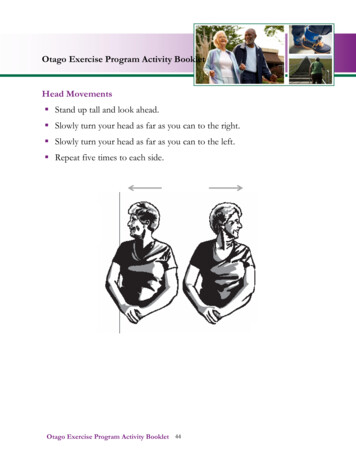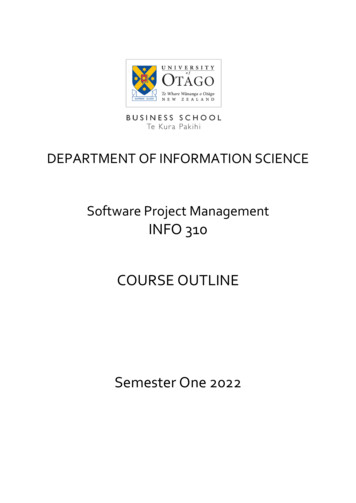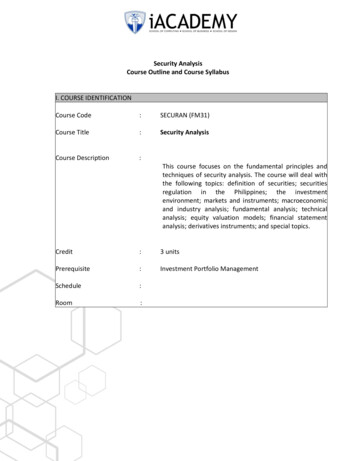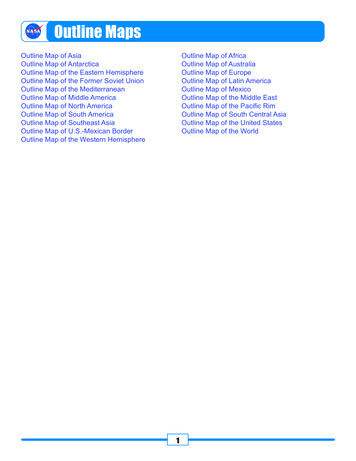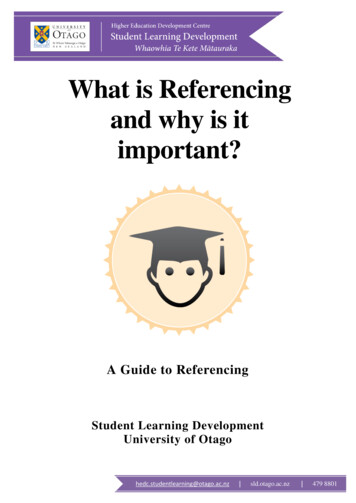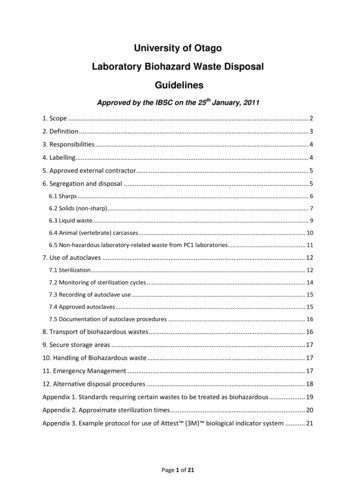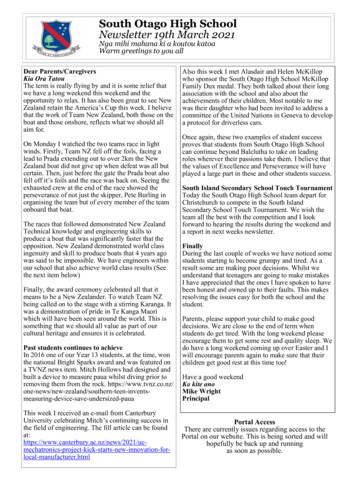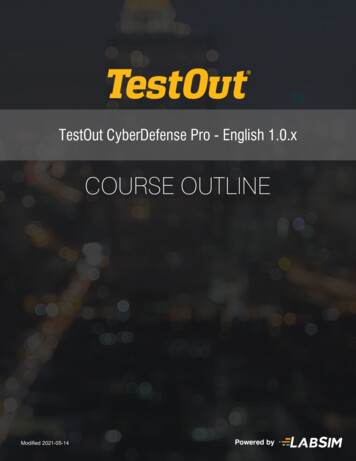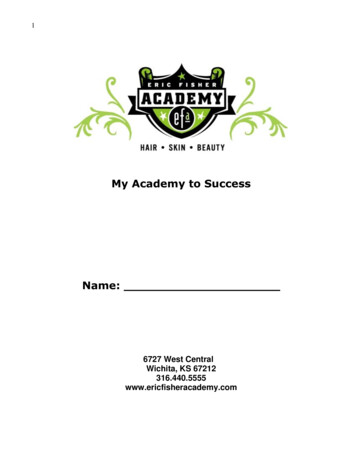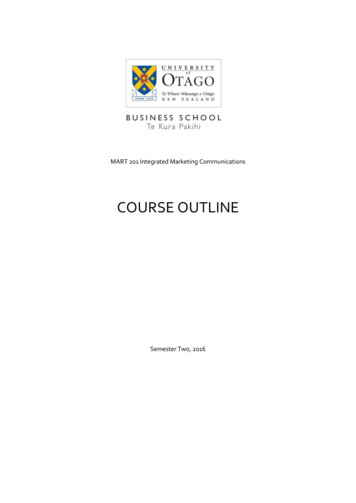
Transcription
MART 201 Integrated Marketing CommunicationsCOURSE OUTLINESemester Two, 2016
MART 201 Integrated Marketing CommunicationsContentsPaper Description and Aims . 1Learning Outcomes . 1Course Delivery . 2Expectations and Workload . 2Course Learning Resources . 3Blackboard . 3Student Webmail . 3Assessment. 3Quality Assurance . 4Learning Outcomes. 4Grading System . 4Course Calendar. 6Student Learning Support and Information . 8Student Charter . 8Guidelines for Learning at Otago . 8Student Learning Centre . 8Library Support . 8Māori Student Support . 9Pacific Islands’ Student Academic Advisor . 9Disability Information and Support . 9Student Feedback . 9Class Representatives . 9Concerns about the Course . 10Disclaimer . 10Policy on Student Internal Assessment .11Policy for Special Consideration in Final Exams. 12
MART 201 Integrated Marketing CommunicationsPaper Description and AimsStudents are introduced to marketing communication tools such as advertising, promotion, socialmedia platforms and sales promotion which are developed into integrated marketingcommunications plans. Presentation skills are particularly emphasised within this paper.Semester Two0.15EFTS18 PointsPrerequisites: (BSNS103) & (MART112)Learning OutcomesUpon successful completion of this paper, you should be able to Have a sound understanding of marketing communication theories and their practicalapplication Have a sound understanding of marketing communication tools and their applicationBe able to critique integrated marketing communication campaignsProduce an integrated marketing communication strategy planDevelop analytical, problem solving, planning, communication, interpersonal and creativeskillsPaper AdministratorName:Cathie ChildOffice:CO 6.42Email:cathie.child@otago.ac.nzOffice Hours: Please refer to BlackboardLecturerName:Office:Email:Office Hours:Dr Shelagh FergusonCO 6.33shelagh.ferguson@otago.ac.nzPlease refer to BlackboardLecturerName:Office:Email:Office Hours:Dr Leah WatkinsCO 6.40leah.watkins@otago.ac.nzPlease refer to BlackboardLecturerName:Office:Email:Office Hours:Dr David BishopCo 6.17david.bishop@otago.ac.nzPlease refer to BlackboardPage 1
MART 201 Integrated Marketing CommunicationsYou should contact Cathie with any administrative enquiries about the paper, e.g. tutorial changes,or requests for late submission of assignments.Course DeliveryLecture Day/Time: Monday and Wednesday 1:00-1:50pmRoom: TBATutorials : TBAStudents must attend two 50 minute lectures every week and one 50 minute tutorial eachfortnight .Lectures present the key conceptual material through discussion and interaction between teachingstaff and students. Lectures are supported by readings.Tutorials are interactive, collaborative sessions in which students attempt to cement conceptspresented at lectures with their peers in a supportive environment.Tutorials begin in the second week of semester. You will be allocated to a tutorial and this will beavailable in eVision. Tutorial times and locations will be posted on Blackboard during the first weekof lectures.Tutorials offer you the opportunity to work in groups on a series of tasks designed to apply theconcepts that you have been exposed to in class and from your reading, and to stimulate yourinterest in the course as it applies to “everyday” issues. The key feature of tutorials, as opposed tolectures and individual study, is participation of all members of the tutorial group. Please preparefor tutorials before going to them.Course Calendar The course calendar (in this outline) details scheduling information. Note that thiscalendar may change as the course proceeds. Any changes will be announced at lectures and bedetailed on Blackboard.Students are expected to prepare for and attend all classes to gain full benefit from the courseThese activities should be prepared for by reviewing information detailed on Blackboard andcompleting any assigned readings. Students unable to attend a lecture are expected to catch up onmissed material. Unless stated otherwise, all aspects of the course are examinable.Expectations and WorkloadMART 201 is an 18 point paper. The University guidelines suggest students can expect to spendabout two hours working per week, per three points, for a single semester paper. You shouldanticipate spending an average of 12 hours per week on this subject.Page 2
MART 201 Integrated Marketing CommunicationsCourse Learning ResourcesRequired textBelch, Belch, Kerr & Powell (2014) Advertising: An integrated marketing communicationperspective, 3rd edit, North Ryde, McGraw-Hill.(If this 3rd edition is not available, then the 2nd edit of 2012 would be ok.)Recommended texts in supportPickton & Broderick (2005). Integrated Marketing Communications, 2nd Edit., Harlow: PearsonEducation.Lisa Emerson (2009) Writing Guidelines for Business Students, 4th Edit., CengageBlackboardBlackboard https://blackboard.otago.ac.nz/ provides you with access to course materials, classnotices, and resources. Blackboard is used to email the whole class so it is important that you checkyour student email and Blackboard regularly.Student WebmailIMPORTANT - DO THIS NOW:Forward your University email address to an email address that you use regularly as follows:1. Log into your StudentMail account using your student username and password2. Click Cog button (top right corner) Options3. Under Account, select the Forward your email shortcut under the Short Cuts menu on theright side of the screen.4. Under the Forwarding heading, type in the email address you want your email to be forwardedto. You can also choose to have a copy of these emails kept on your StudentMail account, soplease check the box if you would like this.5. Click the Start forwarding button.AssessmentAll material presented is examinable (except where stated otherwise) by assignments and the finalexamination. All important assessment information such as due dates and times, content,guidelines and so on will be discussed at lectures and, where appropriate, detailed on Blackboard.Students are responsible for ensuring that they are aware of this information, keeping track of theirown progress, and catching up on any missed classes.AssessmentDue date% offinal gradeIMC Campaign Analysis – written report Submitted in tutorial hour – week 15%(individual)beginning 15/8/2016Campaign brief – written (group)No tutorial but submitted in tutorial hour 10%week beginning 22/8/2016IMC Campaign Project – presentation Presentationstimetabled–week 25%beginning 26/9/2016(group)Final examination (open book)TBAPage 350%
MART 201 Integrated Marketing CommunicationsLate AssignmentsAssignments received after the deadline will have 25% deducted from the available grade for thepiece of assessment (ie. a 78% becomes a 53%).Referencing Style and Style GuideFor this paper the referencing style is short Harvard. Here is a link to the style guide: (insert h/citation.htmlQuality AssuranceAt the Otago Business School we monitor the quality of student learning and your learningexperience. Your assessed work may be used for assurance of learning processes, such asevaluating the level of achievement of learning outcomes, with the aim of improving the quality ofour programmes. All material used for quality assurance purposes will be treated as confidentialand the outcome will not affect your grades.Learning Outcomes Produceanintegratedcommunication strategy plan marketing Develop analytical, problem solving, planning,communication, interpersonal and creative skillsTotal 15%Grading SystemThe grading scheme used at Otago is:A 90-100A85-89A80-84B 75-79B70-74B65-69Total Be able to critique integrated marketingcommunication campaignsExam IMC Project Have a sound understanding of marketingcommunication theories and their practicalapplicationHave a sound understanding of marketingcommunication tools and their applicationCampaignBrief IMC CampaignAnalysisLearning OutcomeC CCDE60-6455-5950-5440-49 40Page 410% 25%50%100%
MART 201 Integrated Marketing CommunicationsAcademic IntegrityStudents should ensure that all submitted work is their own. Plagiarism is a form of academicmisconduct (cheating). It is defined as copying or paraphrasing another’s work and presenting it asone’s own. Any student found responsible for academic misconduct in any piece of work submittedfor assessment shall be subject to the University’s dishonest practice regulations, which may resultin serious penalties, including forfeiture of marks for the piece of work submitted, a zero grade forthe paper, or in extreme cases, exclusion from the University. The University of Otago reserves theright to use plagiarism detection tools.Students are advised to inform themselves about University policies concerning dishonest practiceand take up opportunities to improve their academic and information literacy. If necessary, seekadvice from academic staff, or the Student Learning Centre. The guideline for students is availableat this link: ex.htmlFurther information about the Academic Integrity Policy, the Student Academic MisconductProcedures and the Academic Integrity can be found through the links below. The AcademicIntegrity website in particular has a number of useful inks and suggestions as to where students canget help with referencing tudy/academicintegrityPage 5
MART 201 Integrated Marketing CommunicationsCourse CalendarLecture/TutorialNumber1LeahWeek CommencingMonday 18 July3LeahMonday 25 July5LeahBelch Ch. 1 & 2IMC in Action -David BishopIntroduction toCommunicationBelch Ch.5 & 6TUTORIAL 1Belch Ch. 7Belch Ch. 8TUTORIAL 2Communication andResponse ModelsGuest Lecture- TeresaSmith Library Ethics:Marketing Communicationand SocietyBrand CommunicationMonday 1 AugustMonday 8 AugustSegmentation, Targetingand PositioningObjectives, Evaluation andBudgetingBelch Ch. 9Belch Ch. 10Belch Ch. 11 & 12Message StrategiesMonday 15 AugustMessage Appeal andExecution7LeahNotesIntroduction: What is IMC ?Guest Lecture: Rob AitkenCreativity and Strategy6LeahReadingMonday 11 July2Leah4LeahTopicMonday 22 AugustGuest Lecture – IMC inAction – David BishopMid Semester Break29 August – 2 SeptemberSales Promotion8ShelaghMonday 5 September9ShelaghMonday 12 September10ShelaghMonday 19 SeptemberUnder the RadarCommunicationsSponsorship, Event andEndorsements 1 & 2Technology based IMCPage 6Belch Ch.11TUTORIAL 3CampaignAnalysis (15%)submittedintutorial hour week beginning15/8/16No tutorial butCampaign Brief(10%)submittedintutorial hour week beginning22/8/16Belch Ch. 16Belch Ch.15Belch Ch.3 & Ch.12TUTORIAL 4
MART 201 Integrated Marketing CommunicationsAdvertisingMedia Planning11ShelaghMonday 26 September12ShelaghMonday 3 October13ShelaghMonday 10 OctoberTBCSocial and Cause relatedIMCSocial Media case studyExam Case studyExam Lecture and CourseReviewIMCProjectPresentations(25%)(TUTORIAL 5 note some ofthese will beoutsideoftutorial times)Belch Ch. 3-4TUTORIAL 6Lectures end Friday 14 October 2016University Exam Period Second Semester 15 October – 12 November 2016Page 7
MART 201 Integrated Marketing CommunicationsStudent Learning Support and InformationStudent mlGuidelines for Learning at otago.ac.nz/hedc/learning/Student Learning CentreThe Student Learning Centre, which is part of the Higher Education Development Centre, provideslearning support, free of charge, to ALL enrolled students. Their services include: a workshop programme designed to help students to improve their learning strategies and theirgeneric skills: http://slc.otago.ac.nz/attend-a-workshop/ free and confidential consultations with a learning adviser for assistance with learningstrategies; http://slc.otago.ac.nz/talk-to-a-learning-adviser/ on-line study skills advice; a student leadership programme a student-led peer support programme for students of all ages and backgrounds. conversational English groups for students from a non-English speaking backgroundThe Centre also provides two very helpful study guides, “Guidelines for Writing and Editing” and“Writing University Assignments” and these are available on the SLC website.http://slc.otago.ac.nz/PASS or Peer-Assisted Study Sessions are available for all BSNS 100 papers. PASS supports studentsuccess through weekly one hour interactive study groups. These groups are facilitated by 2nd or3rd year students who have successfully completed the course. PASS sessions focus on integratingthe course or paper content (what to learn) with academic reasoning and study skills (how to learn).The PASS session timetable is listed on Thursday of week 1 of each ion/ Phone 64 3 479 5786 or 0800 808 098, oremail:slc.reception@otago.ac.nzLibrary SupportThe Library website http://www.otago.ac.nz/library provides access to resources and services,including group room bookings, library hours and locations, past exam papers, subject guides,article databases and more.If you need assistance either check out the self-help guides http://otago.libguides.com/selfhelp, orask Library staff at the ground floor service desks, or email ask.library@otago.ac.nzPage 8
MART 201 Integrated Marketing CommunicationsMāori Student SupportTënā koutou katoa,Ko Corey Bragg töku ingoaKo Ngāi Tahu, Kāti Mamoe, Waitaha me Ngāti Kahungunu öku iwiKia ora, my name is Corey Bragg and I am the Māori student support person in the BusinessSchool. My role is to help link Māori students with the various support networks throughout theuniversity and the community. Kaua e whakamā, don't be shy - come in for a chat. Mauri ora mai.Tel 479 5342 Email corey.bragg@otago.ac.nz Room CO 3.21Pacific Islands’ Student Academic AdvisorWarm Pacific GreetingsTalofa lava, my name is Esmay Eteuati and my role is to liaise with Academic Departments andStudent Services relating to Pacific students’ and their course of study. I support both staff andstudents in the Business School and have a network of Pacific contacts in other Divisions around theUniversity.Tel 64 3 479 4756 Email: esmay.eteuati@otago.ac.nzDisability Information and SupportStudents are encouraged to seek support if they are having difficulty with their studies due todisability, temporary or permanent impairment, injury or chronic illness. It is important to seek helpearly, through one of the contacts below:Mathew ParackalEmail: mathew.parackal@otago.ac.nzPhone 479 7696International StudentsThe Otago Business School encourages international students to seek support if they are havingdifficulties with their studies or meeting other challenges while they are students at the Universityof Otago. In such instances, international students should feel free to contact International StudentSupport:Telephone: 479 8344Email: international.support@otago.ac.nzWebsite: www.otago.ac.nz/internationalLocation: Archway West BuildingStudent FeedbackWe encourage your feedback. This can be in the form of contacting staff, participating in courseevaluation surveys and communicating with class representatives. Continual improvements will bemade to this course based in part on student feedback.Class RepresentativesThe class (or student) representative system is an avenue for encouraging communication andconsultation between staff and students. It provides you with a vehicle for communicating yourviews on the teaching and delivery of the paper and provides staff with an opportunity tocommunicate information and gain constructive feedback from students. It contributes to thePage 9
MART 201 Integrated Marketing Communicationsdevelopment of a sense of community within a department and it adds a further dimension to therange of support services offered to students.Volunteers for the role of class representatives will be called early in the semester. The OUSAinvites all class representatives to a training session, conducted by OUSA, about what it means tobe a class representative and some of the possible procedures for dealing with issues that arise.They also provide information on the services that OUSA offers and the role OUSA can play insolving problems that may occur. The OUSA provides support to class representatives during thesemester. Departmental staff will also meet with class representatives during the semester todiscuss general issues or matters they wish to have considered.Your class representative’s name and contact details will be posted on Blackboard early in thesemester.Concerns about the CourseWe hope you will feel comfortable coming to talk to us if you have a concern about the course. TheCourse Co-ordinator will be happy to discuss any concerns you may have. Alternatively, you canreport your concerns to the Class Representative who will follow up with departmental staff. If,after making approaches via these channels, you do not feel that your concerns have beenaddressed, there are University channels that may aid resolution. For further advice or moreinformation on these, contact the departmental administrator or head of department.DisclaimerWhile every effort is made to ensure that the information contained in this document is accurate, itis subject to change. Changes will be notified in class and via Blackboard. Students are encouragedto check Blackboard regularly. It is the student’s responsibility to be informed.Page 10
MART 201 Integrated Marketing CommunicationsUNIVERSITY OF OTAGOPolicy on Student Internal AssessmentThe purpose of this document is to have a consistent policy throughout the department as well as to develop students’ time managementskills. It reflects usual practices in the business world in which neither success (here: grades) nor deadlines are negotiable.1.Dissemination of Grades – Regarding internal assessment, the numerical marks will be returned to students via eVision no laterthan two weeks after the assessment has been submitted. All students are requested to check their marks as they appear oneVision. Any discrepancies should be reported to the course administrator as soon as possible.2.Late Assignments – Assignments received after the deadline and within 24 hours after the deadline will have 25% deducted fromthe available grade for the piece of assessment (ie. a 78% becomes a 53%). Assignments received 24 hours and later than thedeadline will not be marked and there will be no grade given.3.Extensions – Extensions will be granted only in exceptional circumstances (eg. illness with supporting medical documentaryevidence stating nature and length of impairment, family emergency, provincial or national representative activities) by theappropriate paper administrator.If the assignment or internal assessment tests count significantly towards the final result then a formal medical certificate isrequired. As a guideline, an internal assessment component which counts for 20% of the final result would be consideredsignificant.4.Tutors and lecturers are not authorised to give extensions. Only the paper administrator should be approached (consult the courseoutline for the person(s) responsible).Computer problems do not constitute an exceptional circumstance unless it is an officially notified failure of university equipment.5.Plagiarism – Plagiarism is the dishonest use of someone else’s words, facts or ideas, without proper acknowledgement. Moststudents will include other people’s ideas and information in their work and assignments - such material may be either quoted ordigested and used by students. In either case, acknowledgement is essential. Note that the University of Otago Calendar underStudent Conduct Rules Part 1 Section 1 (e) states that no student shall “engage in any dishonest practice as described in regulation5(b) of the Examinations and Assessment Regulations in connection with an examination or other method of academic work whichcounts towards the attainment of a pass in any subject.”6.Problems with group work – Where group work is set and a group is experiencing difficulties, the students should approach theirtutor to try to resolve these differences. The tutor will counsel the group, or individuals from the group, on the procedures open tothem to resolve group problems (the problem should be raised prior to the work being completed or handed in).The procedure to be followed is:i)students should try to resolve the problems within the group without outside assistance.ii)students should meet with their tutor to endeavor to resolve outstanding issues.iii)the tutor will arrange for students to meet with the paper administrator who will endeavor to resolve the situation.This procedure MUST be completed to step iii) before the assignment is submitted for grading. Where there are still unresolveddifficulties, step iv) will be implemented.iv)students will complete a ‘Peer Assessment’ form available from the appropriate paper administrator (which must besubmitted to the tutor or paper administrator before any grades are released).Paper administrators reserve the right to require all students to complete peer assessment forms at any time during and/or aftersubmission of an assessed group project. Should there be differences in the peer assessment forms, the student(s) will be required toeither submit in writing to, or meet with a group comprised of their paper administrator and lecturer(s) and others (as deemedappropriate) to provide an explanation for the discrepancy. A differential allocation of grade may result from this process.Page 11
MART 201 Integrated Marketing CommunicationsUNIVERSITY OF OTAGOPolicy for Special Consideration in Final Exams*** All applications for special consideration must be dealt with throughthe examinations office not the department ****The Special Consideration provisions apply only to final examinations and only where it is clearly documented that a candidate has beenprevented from taking an examination through illness or other exceptional circumstances beyond his or her control; or has been seriouslyimpaired by illness or other exceptional circumstances beyond his or her control at the time of, or in the 14 day period immediately priorto the examination itself. Where students have been affected by illness or other exceptional circumstances during the teaching period,they are expected to have informed Heads of Departments directly at the time (not individual lecturers or tutors).ProcessYou need to obtain an application form from the University Information Centre or Student Health. You can also download the Applicationfor Special Consideration in Final Examinations form Application for Special Consideration in Final Examinations formIf your condition persists and you find that you are still seriously impaired for a later examination, do not submit a second applicationform, but contact the Examinations Office for advice ( 64 3 479 8237).No special arrangements can be made for candidates who fail to attend examinations at the correct time.Deadline:Five calendar days from the date of the last examination for which you are making an application for Special Consideration.Please Note:Applications cannot be accepted without supporting documentation such as a medical certificate.For further information please see: Health Declaration for Special Consideration ApplicationAbsences1.A student may be offered an aegrotat pass providing:(a)their grade for internal assessment is C or better and(b)the internal grade they have achieved has contained a significant element of individual work as opposed to groupassignments (25% of the total grade for the paper).2.All other cases will be offered a special examination.3.In some cases that qualify for an aegrotat, it may be relevant to offer the student the choice of an aegrotat or a specialexamination. For example aegrotats at any stage of the course can have a detrimental effect on a student’s ability to qualify forscholarships.4.Special examinations for Semester One 2016 will be held on (date to be arranged), in the week prior to Semester Twocommencement.Special examinations for Semester Two 2016 will be held on (date to be arranged), two weeks after cessation of officialexamination period.Impaired Performance1.If the student has no internal assessment there will be no adjustment to the exam mark and only an optional special will beoffered.2.If the student has internal assessment the examination mark may be adjusted by taking account of the discrepancy between theexamination and internal marks, with particular attention to individual work for the student in comparison to that for the wholeclass.3.In all other circumstances the student will be offered the choice of accepting this mark or sitting a special examination.4.Once a student accepts to take a special examination the original examination mark is nullified and the result of the specialexamination replaces the original mark, even if it is lower. Any absence or impairment for the special examination must becovered using the same regulations as apply for normal university examinations.Page 12
Be able to critique integrated marketing communication campaigns Produce an integrated marketing communication strategy plan Develop analytical, problem solving, planning, communication, interpersonal and creative skills Total 15% 10% 25% 50% 100% Grading System The grading scheme used at Otago is:
